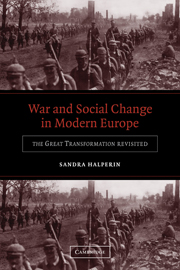Book contents
- Frontmatter
- Contents
- Tables
- Preface
- INTRODUCTION
- I SOCIAL FORCES, INDUSTRIAL EXPANSION, AND CONFLICT IN EUROPE'S NINETEENTH-CENTURY MARKET SYSTEM
- II THE INTERREGNUM
- III THE GREAT TRANSFORMATION
- 8 The Post–World War II Order
- 9 The Great Transformation and the Eternal Return: “Globalization” Reconsidered
- Appendix 1 Europe Defined
- Appendix 2 A Sample of Europe's Class, Ethnic, and Imperialist Conflicts, 1789–1945
- Appendix 3 European (Regional and Extraregional) Wars, Insurrections, Rebellions, Revolutions, Uprisings, Violent Strikes, Riots, and Demonstrations, 1789–1945
- Works cited
- Index
9 - The Great Transformation and the Eternal Return: “Globalization” Reconsidered
Published online by Cambridge University Press: 06 July 2010
- Frontmatter
- Contents
- Tables
- Preface
- INTRODUCTION
- I SOCIAL FORCES, INDUSTRIAL EXPANSION, AND CONFLICT IN EUROPE'S NINETEENTH-CENTURY MARKET SYSTEM
- II THE INTERREGNUM
- III THE GREAT TRANSFORMATION
- 8 The Post–World War II Order
- 9 The Great Transformation and the Eternal Return: “Globalization” Reconsidered
- Appendix 1 Europe Defined
- Appendix 2 A Sample of Europe's Class, Ethnic, and Imperialist Conflicts, 1789–1945
- Appendix 3 European (Regional and Extraregional) Wars, Insurrections, Rebellions, Revolutions, Uprisings, Violent Strikes, Riots, and Demonstrations, 1789–1945
- Works cited
- Index
Summary
The world, even if it is no longer a God, is still supposed to be capable of the divine power of creation, the power of infinite transformations; it is supposed to consciously prevent itself from returning to any of its old forms; it is supposed to possess not only the intention but the means of avoiding any repetition.
The recently attained preponderance of the scientific spirit over the religious, God-inventing spirit leads us to the belief that the world, as force, may not be thought of as unlimited, that the world lacks the capacity for eternal novelty. By rejecting the belief in the “beyond,” the limitless, the transcendental, we reject also the belief in the capacity for eternal novelty.
Friedrich Nietzsche, The Eternal RecurrenceIf the French Revolution were to recur eternally, French historians would be less proud of Robespierre. But because they deal with something that will not return, the bloody years of the Revolution have turned into mere words, theories and discussions, have become lighter than feathers, frightening no one. There is an infinite difference between a Robespierre who occurs only once in history and a Robespierre who eternally returns, chopping off French heads.
Milan Kundera, The Unbearable Lightness of BeingKarl Polanyi assumed that the demise of the unregulated market system would bring about a “great transformation” both in the nature of the international system and in its constituent states.
- Type
- Chapter
- Information
- War and Social Change in Modern EuropeThe Great Transformation Revisited, pp. 269 - 296Publisher: Cambridge University PressPrint publication year: 2003



